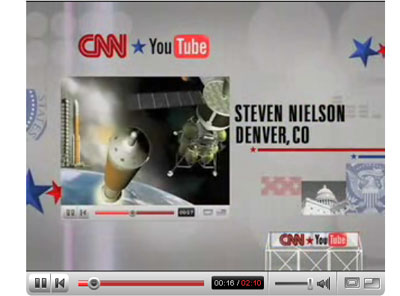Announcing the 2008 Space VidVision Contestby Greg Zsidisin
|
| The competition is intended to spur people to think about the issues facing spaceflight today. |
The overwhelming judging criterion will be the strength of the argument made for the stance the video presenter(s) may take. We are not limiting the responses to pro-NASA, pro-NewSpace—or even pro-space. The judges, most of who are on the Space Frontier Foundation Board, are being asked to look at the soundness and persuasiveness of the case being made. (To be sure, some consideration will be given to “watchability” as well.)
What do we expect from this? As project director, I am sure we will get all kinds of responses, from sober analyses to enthusiastic entreaties to… well, who knows? A friend in New York, John Pazmino, warned me of bunny-hopping astronauts and parodies of Star Trek and 2001: A Space Odyssey. Frankly, I think that’s all fine, although I’m not sure if the sort of video Pazmino describes would win our award. Or dramatic-look piano-playing space cats, for that matter.
In fact, I’m hesitant to say at all what my own expectations of entries are. YouTube and other video sites show us a wealth of delightful creativity, often from surprising directions. (And yes, they also help to support Theodore Sturgeon’s famous contention that “Ninety percent of everything is crud.”)
Given the contest’s relatively short timeframe—barely more than a month—I imagine most entries will consist of contestants speaking into a webcam. Maybe some will be supported with a few spliced-in graphics. For our main judging criterion, that would be fine. But I would love to be surprised, too.
No matter what the result, I am very grateful to Will Watson at the Space Frontier Foundation for enthusiastically signing on to this project, as well as to Benjamin Higginbotham of Spacevidcast.com for his generous support as a cosponsor. Until recently, I was prepared to launch this contest as a simple solo effort using my own money as a prize. As a result of their interest, we will now have a $2,000 first prize. Depending on fundraising being finalized at this writing, we will have second and third prizes of at least $500 each. Thanks to the Foundation, we will also be a prominent part of their annual conference in July, as well as the aforementioned awards banquet.
I am also personally indebted to John Benac and Steven Nielsen for reminding me that motivated individuals can make an impact. Nielsen used a video post to great effect to get a space question into the CNN/YouTube Republican debate last November. After his own debate question campaign, Benac went on to create the advocacy website Political Action for Space. Both of these people strongly influenced my decision to put this contest together as my personal contribution to space advocacy.
As I have written recently in several articles here on The Space Review, we are arguably at the most crucial point in time for spaceflight since the end of Apollo. I hope this contest gets people to come out and speak publicly about this. And I hope that it will help spur other individuals to come up with their own ways to promote the issue of space this election year.
